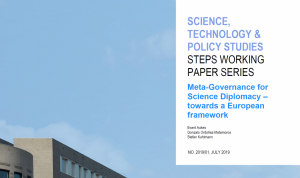First version of a science diplomacy governance framework developed in S4D4C published by the University of Twente


As part of a series of working papers, (STePS working paper series "Science, Technology & Policy Studies"), S4D4C project partner University of Twente published a first version of a science diplomacy governance framework, which was developed in the frame of the S4D4C project. The governance framework is building on and co-evolving with other outcomes and lessons of the project.
Full details of the publication can be found below.
"Meta-Governance for Science Diplomacy – towards a European framework"
– Ewert Aukes, Gonzalo Ordóñez-Matamoros, Stefan Kuhlmann
Science Technology & Policy Studies (STePS), University of Twente, the Netherlands
Abstract:
More and more foreign policy organisations become imbued with the promises Science Diplomacy might hold. It may transform or at least reframe the mobilization of knowledge in and for international scientific as well as political relations, not least to address Grand Societal Challenges. Such popularization in the foreign policy field has caught the attention of science policy with the intention to substantiate the hitherto opaque de facto patterns of interaction and exchange that shape Science Diplomacy as a practice aimed at bridging science and policy in the international arena. As one objective of the EU H2020-funded S4D4C project, the empirical substantiation of Science Diplomacy in nine case studies co-evolves with the development of a meta-governance framework aimed at enabling EU science-diplomatic processes to thrive.
Hence, this paper focuses on the process and emerging substance of the meta-governance framework in the making. In order to discover the patterns and structural mechanisms guiding Science Diplomacy, its inner workings and appearances in different fields need to be described. Science Diplomacy, is here understood as a constellation of governance arrangements, stakeholders and de facto governance practices. Governance arrangements include the formal organization of the case topic, a.o. legal frameworks, rules, policy instruments, governmental strategies, official guidelines and prescribed actors. This includes how and through which channels/interfaces actors relate to each other in terms of substance and procedures, and the challenges of interactions between different stakeholders. De facto governance practices involve the actual mix of all formal processes and procedures and those where actors deviate from the formal governance arrangement and perform with bureaucratic discretion. Here, it is also interesting how synergetic links are made to other social or political problem fields to further actors’ interests.
With these inner workings in nine Science Diplomacy cases, the building bricks for the meta-governance framework can be derived. Preliminary findings point to the fact that facilitating interaction and exchange between actors in the foreign policy community and the science community as well as the provision of strategic intelligence is a hiatus that such a meta-governance framework can use to develop principles of interaction.
The paper is available through the website of the University of Twente (including citation information) or can be downloaded below.
->>>> DOWNLOAD THE PAPER HERE!
You can also learn about the ideas on the governance framework from the poster presented at the conference in Valencia "Towards a Global Research Agenda for Transformative Innovation Policy" (TIP 2019) in November 2019 from the website of the University of Twente.
->>>> DOWNLOAD THE POSTER HERE!